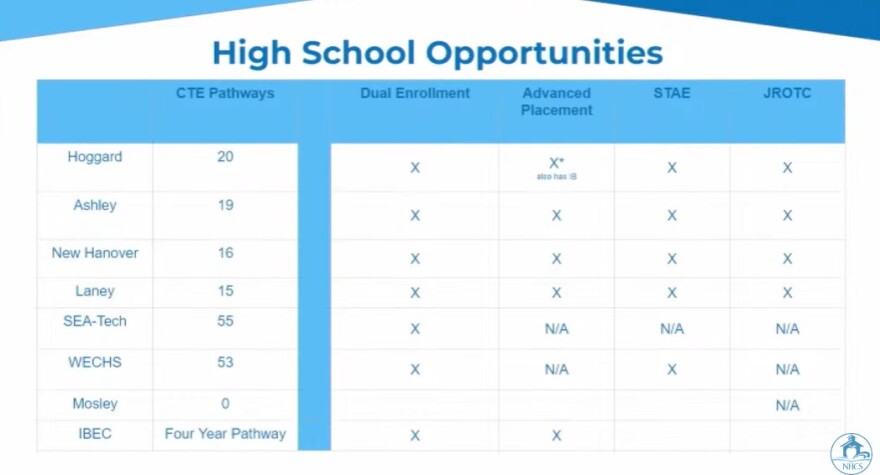Late last year, on Friday, November 24, parents of high school students at the Career Readiness Academy at Mosley received a letter informing them that the high school program is closing at the end of this school year.
The decision affects 63 students enrolled in the program; more than half are Hispanic or Latino — and 58% are economically disadvantaged.
Karen Sell is a parent of a child attending Mosley. She said her son has severe obsessive-compulsive disorder and social anxiety — but in the two years he’s been at Mosley, he’s shown great improvement.
That's what has made the closing of Mosley so upsetting to parents like Sell.
“And I think that they more than likely thought that it was a bunch of poor families and uneducated families and Hispanic families that they could just bully around basically," she said.
At a special meeting before Tuesday's public hearing, Board Vice Chair Melissa Mason made a motion to delay the district timetable by two weeks to allow for parents and students at Mosley to make decisions. That motion passed 4-3.
Board members also voted 6-1 to hear a cost-benefit analysis for the program at their next regularly scheduled meeting where they are expected to make a decision.
At the public hearing, students, parents, and concerned community members all spoke in favor of keeping Mosley open, at least until all current students graduate.
Some criticized what they called a lack of transparency and said the presentation given by Chief Academic Officer Dr. Patrice Faison was “slanted” to make the program look bad academically — as well as being too expensive. The potential savings of closing the program, according to Dr. Faison, would be around $787,000.
Board member Stephanie Walker brought attention to conflicting information; asking Dr. Faison to clarify whether or not Mosley had a STAE program — a program designed to help students who might otherwise be overwhelmed by a large high school environment prepare for dual enrollment, college, or university.
In Faison's presentation, there was a slide comparing 'high school opportunities,' where Mosley was listed as not having such a program, compared to the district's four traditional high schools, which do — an implicit negative when evaluating the value of the program.

Walker's question was met with applause from some crowd members — some of whom told WHQR that students and staff already consider Mosley to have a STAE program. Dr. Faison essentially conceded that point, responding to Walker that Mosley was such a small program, that it could be considered STAE already.
The slide also suggests Mosley doesn't have dual enrollment — where students are allowed to take college classes at CFCC and UNCW. However, at least one Mosley student spoke at the meeting about taking these classes — so it's not clear if Faison's slide was inaccurate there.
Another slide of the presentation noted that in a poll Mosley students said they would rather return to a traditional high school compared to other options when they leave their current program — but Walker interjected again, asking whether or not students were asked if they wanted to stay at Mosley on this survey. Dr. Faison said that they were not given that option.
Angel Gore, a student at Mosley, addressed the issue: “We don’t want to be guaranteed that you’ll find us a good placement, we have found a good placement for us, at Mosley.”
Gore also noted that Mosley was not an early college program like the other specialty schools it was being compared to, but rather, a college and career readiness program, which made a big difference.
Right before the end of the meeting, board member Hugh McManus asked Superintendent Dr. Charles Foust how long these conversations about sunsetting Mosley had been going on behind the scenes. Foust responded by saying since 2021, to the dismay of some audience members, because the intent to close the program became public only recently.
Mosley was also a topic of conversation for other county leaders.
On Wednesday morning, the New Hanover Board of County Commissioners and School Board held a joint meeting to discuss the budget, since the schools receive funding from the county.
Commissioner Dane Scalise started a conversation about Mosley, asking what the situation was. He told Dr. Foust his concerns with the idea of a “newcomer” school — one possible proposal for the current Mosley facility, which would welcome families who have recently moved to the United States — stating that financial responsibility falls on the county as well and they need to take into account population influxes in housing decisions.
While Foust has been criticized on the left and right for his administration's lack of transparency when it comes to the closing Mosley, some right-leaning critics have also focused on concerns about what a 'newcomer' school would be, in some cases framing it as a "refugee" school or center.


